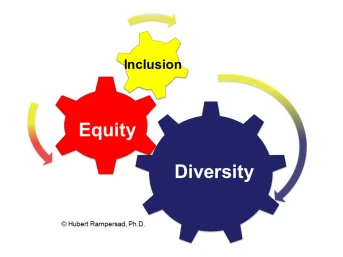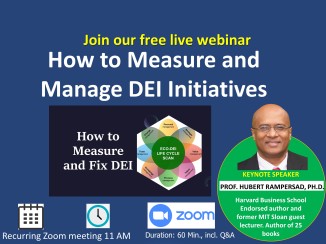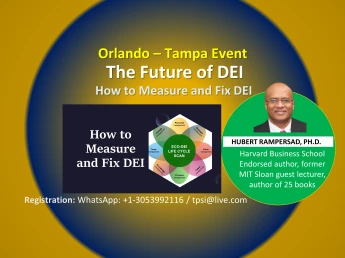“American companies, colleges, and universities need to reconsider their corrupt DEI policies, ensuring they are fair, transparent, and effective. While it’s important to prioritize diversity, equity, and inclusion in leadership hiring processes, ensuring that the most qualified individuals are selected based on their expertise and capabilities is equally crucial. Simply hiring leaders in response to the Black Lives Matter and gender movement may not guarantee the desired outcomes and could potentially compromise the quality of higher education leadership. To address these concerns, leaders need to move beyond diversity, equity, inclusion, gender, and race theater and instead focus on implementing sustainable DEI initiatives. Rebuilding trust requires a reconnection with authenticity, humility, and integrity. By fostering empathy and promoting inner alignment, leaders can create an ethical and sustainable culture of DEI within American companies and education institutions. This shift in focus will ensure that DEI efforts are embedded in the core values and practices of American companies, colleges, and universities, benefiting all members of the community.” –-Hubert Rampersad
DEI at American universities and colleges does not actually promote inclusivity. It is the opposite of diversity of thought. Students are classified into groups based on their race and heritage. DEI is being used as a cover to justify discrimination. Jews are considered “oppressors” by the DEI system, so the discrimination they face is somehow justified by its believers. This kind of ideology at American universities and colleges needs to be eliminated. Survey Shows Minorities Support Death of DEI.
Bill Ackman, a billionaire and Harvard graduate, has voiced his concern regarding the hiring practices of American universities and colleges. He believes candidates are being selected based on diversity, equity, and inclusion (DEI) policies, which can limit the pool of potential candidates by excluding those who do not meet certain criteria based on race or gender. According to a recent analysis by Inside Higher Ed, colleges and universities have hired more non-white leaders in the wake of the Black Lives Matter movement, read “Diversity on the Rise Among College Presidents”. This approach does not necessarily lead to the best leaders being chosen and may ultimately harm the quality of higher education in America. Ackman’s comments come after he called for the resignation of three university presidents who failed to condemn anti-Semitic behavior on their campuses. Harvard’s presidential search committee, for example, only considers candidates who meet the DEI office’s criteria. Ackman believes that shrinking the pool of potential candidates based on race, gender, or sexual orientation is not the optimal approach to identifying the best leaders for our most prestigious universities. Read also “Until DEI offices are closed, don’t expect better college presidents“.
Redefining American colleges and universities is badly needed by redesigning academic departments, developing a new holistic core curriculum, and replacing current corrupt diversity, equity, and inclusion policies. DEI at American colleges and universities are mainly focused on racial and gender justice and cozy initiatives. Their hiring process is not focused on recognizing the value of differences and similarities among people, promoting synergy between diverse talents and skills, and fostering a sense of belonging among all individuals.
New sustainable DEI policies are badly needed to prevent hiring left-brain antisemitic racial bias faculty (faculty bias) and promote a more balanced approach to hiring faculty with expertise in ethics, constitutionalism, civic virtue, family life, religious freedom, and American principles. The new DEI approach must create a more ethical and balanced higher education system in America.
American colleges and universities also teach conventional diversity, equity, and inclusion practices that concentrate mainly on racial justice and surface-level equality and diversity initiatives. This limited approach often fails to provide organizations with the benefits of genuine diversity, equity, and inclusion, resulting in significant financial losses. To truly succeed in this area, colleges, universities, and companies require a comprehensive, measurable, and sustainable approach that addresses diversity, equity, and inclusion authentically and holistically.
ECO-DEI
This new DEI approach, known as ECO-DEI, emphasizes the need for a holistic and long-term view of diversity, equity, and inclusion. Please read my article “Reimagining Diversity, Equity, and Inclusion”.

Diversity refers to the variety of traits and characteristics that make individuals unique. Equity involves understanding and providing individuals with what they need to live whole, healthy lives. Inclusion encompasses the behaviors and social norms that ensure everyone feels welcomed. Belonging describes the sense of fitting in and feeling like a valued group member. On the other hand, equality is about ensuring everyone receives the same resources to achieve this goal. This diagram shows how diversity, equity, and inclusion are interrelated.
ECO-DEI will help universities and colleges cultivate sustainable cultures that promote talent development and foster a sense of involvement, acceptance, respect, and connection to thrive. These cultures should encourage ethical, harmonious, and respectful interactions among individuals, fostering a synergetic culture of trust, learning, open communication, and innovation, ultimately leading to the best results. It is essential to value diverse thinking from individuals with different backgrounds and perspectives.
ECO-DEI Life Cycle Scan
To measure and fix diversity, equity, and inclusion at universities and colleges, institutions need to establish a comprehensive and effective system of metrics to track their progress. Institutions struggle to measure the effectiveness of their DEI initiatives. Managing DEI effectively becomes nearly impossible without proper measurement. Therefore, I present the unique ECO-DEI life cycle scan. The ECO-DEI life cycle scan serves as an assessment system universities and colleges can use to effectively manage and cultivate diversity in their workforce. It outlines the fundamental characteristics required to create a work environment that values and promotes diverse perspectives while encouraging respectful interactions among individuals. The ultimate goal is to ensure that no individual is excluded based on their differences, thus enabling them to achieve their full potential. Read “How to Measure and Fix DEI”.

Important advice to the leadership of American colleges and universities
Restore the Higher Purpose of of your school. Read “How to Restore the Higher Purpose of American Higher Education: Creating a Purpose-Driven University with Good Character of School Leaders, Faculty, and Students”
 Change the institution sustainably, by “Fostering a Culture of Ethics on Campus, Academic Integrity, and Sustainable Good Governance”.
Change the institution sustainably, by “Fostering a Culture of Ethics on Campus, Academic Integrity, and Sustainable Good Governance”. 
Replace current corrupt diversity, equity, and inclusion policies with ECO-DEI. This will prevent hiring left-brain antisemitic racial faculty and faculty bias; Emphasize authentic sustainability initiatives; Re-evaluate your curriculum to ensure that it is sustainable in the long run; Get rid of faculty members who exhibit left-brain and antisemitic racial tendencies with those who possess ethical expertise in personal disruptive innovation, ethics, constitutionalism, civic virtue, family life, religious freedom, and American principles; Prioritize creativity over knowledge; Empower the educational experience with the help of AI; Introduce students to the Personal Disruptive Innovation system, which will help them (re)design their lives, unlock their creative potential, foster a growth mindset, and achieve success in their personal and professional endeavors. This will help them prevent emotional distress, unleash their creative potential, meet social needs, and foster sustainability; Embedding Personal Disruptive Innovation in the curriculum is essential to enable left-brain students to develop their ethical skills, and emotional intelligence, and become ethical critical thinkers; Redesigning academic departments will also be beneficial; Instead of focusing on the number of publications and famous speakers, it’s better to concentrate on innovative research. Read also “Redefining American Higher Education” and “How to Restore the Higher Purpose of American Higher Education”.
Hubert Rampersad, Ph.D.
If you’re interested in gaining more knowledge about our DEI program, you may want to consider joining our Orlando–Tampa Live Event: How to Measure and Fix DEI
and our free Live Webinar: How to Measure and Manage DEI Initiatives.

You may also want to consider becoming a Certified ECO-DEI Practitioner.
Hubert Rampersad, Ph.D., founded the Center of Excellence in Human-Centered and Purpose-Driven AI Innovation in Orlando. He is a Dutch-American visionary leader in innovative solutions for genuine sustainability, disruptive design innovation, critical thinking in the age of AI, human-centered and purpose-driven AI, and entrepreneurial leadership. He holds a Ph.D. in Innovation Sciences, an MSc in Technology Engineering & Robotics, and a BSc in Mechanical Engineering from leading accredited universities in the Netherlands (Delft University of Technology, Eindhoven University of Technology). He is a well-known futurist, advocating for genuine sustainability on a global scale. With extensive knowledge and expertise, he has authored 25 books on the topics above in many languages and is highly regarded for his insights in these fields. One of his books, “Total Performance Scorecard,” has been published in 20 languages. Dorothy Leonard, an innovation professor at Harvard Business School, wrote the book’s foreword. Rampersad has also previously served as a guest lecturer at MIT Sloan and was featured in BusinessWeek. He was a senior design innovation coach at ASML, the most important tech company in the world and “Europe’s most valuable tech firm“.
Orlando, Florida |tpsi@live.com | WhatsApp: +13053992116






